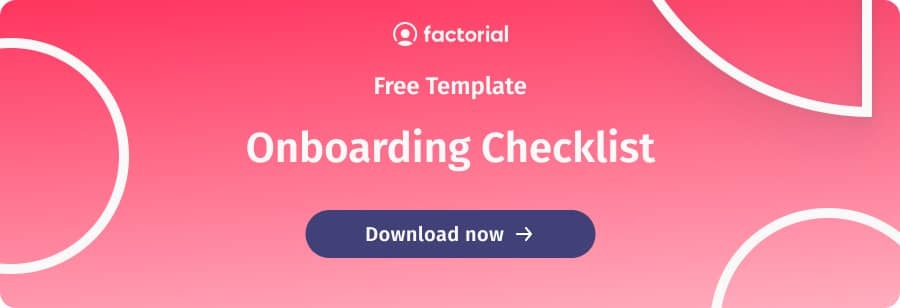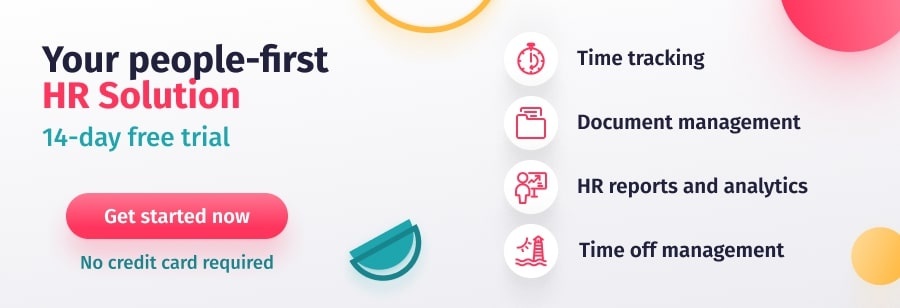A new hire’s first day on the job usually involves training, paperwork, and general employee onboarding. However, it’s also important to welcome a new employee to the team. This not only helps them integrate successfully into your company, but it can also be a strategic tool for increasing engagement and retention levels. So much so that, according to HR magazine, 54% of employees are dissatisfied with their onboarding experience.
This guide will help you understand how to make new hires feel welcome. We will discuss how to create a pack to welcome new hires, and what you should include in your welcome letters. We will also share best practices so that you can welcome new employees in a way that sets them up for success in your organization.

How to Welcome a New Employee
There are a number of reasons why it is important to welcome a new employee when they join your company. For one thing, it shows that you are a professional organization with welcoming company culture. It also shows new hires that you are excited about them joining your company. Plus, when you take the time to welcome new employees it helps them smoothly integrate into your organization.
It’s the best way to make a positive and lasting first impression.
There are a number of things to keep in mind when you welcome new hires. Firstly, you need to make sure you welcome them before they arrive on their first day. Ideally, this should be done during the preboarding phase. This will help new employees feel comfortable and reduce those first-day nerves.
If you don’t already have one, you should create an onboarding checklist to make sure everything is covered during this vital introductory phase. HR onboarding software is also a highly effective solution for making sure you get the most from the process.
Here are some of the things you need to consider when you welcome a new employee to the team:
Welcome Message & Kit
This helps break the ice and make new employees feel a part of the team. This is also a great opportunity to provide employees with all the information they need for their first day. This includes your company dress code, working hours, parking facilities, company policies, and onboarding schedules.
Training
Make sure you prepare suitable training for an employee’s first day with you. Explain in advance what training will involve. This will help them understand how your processes and procedures work and what’s expected of them. It will also help build their confidence in their new role. The more prepared they are, the quicker they will be able to get up to speed and become productive members of your organization.
Tools and Resources
Make sure you provide new hires with all the tools and resources they need in advance so that they can focus on integration and building relationships on day one. This includes email addresses, parking passes, swipe cards, and IT software and equipment. Also make sure they are aware of all the tech tools they will be using, such as Slack, Asana, or Google Docs.
Company Documents
It’s always best to complete as many onboarding documents in advance as possible so that less time is spent completing paperwork on an employee’s first day. For example, if you work in manufacturing, you can share information about Good Manufacturing Practices in advance so that new hires can begin familiarizing themselves with materials and equipment.
You should also make sure you clarify the difference between onboarding vs. orientation so that your new hire knows what to expect when they arrive at the office.
Introductory Email
Finally, take the time to draft a message for the rest of your team and/or organization, introducing the new hire to their soon-to-be colleagues. This could be a formal email or even just a simple Slack message in your company’s #general channel.
How to Welcome a New Employee Virtually
The steps you need to follow to welcome a new employee virtually are essentially the same, with the obvious difference that they will not be physically present in your office. This is what’s known as remote or digital onboarding.
This essential part of welcoming a new hire helps introduce them to the company culture, their team, and the overall business goals and objectives. This is a vital step as a remote employee will need extra support in order to feel integrated into the team and company as a whole. If approached correctly, it can set up a new worker for success in the future.
How to Welcome a New Employee Virtually: Tips
- Focus on helping to break the ice and help new hires feel connected with their new team. Encourage existing employees to reach out in order to welcome a new coworker and help them feel comfortable. You could even consider pairing up new hires with a virtual mentor or work buddy so that they have someone to lean on for support.
- Create a virtual gathering or virtual coffee break to introduce new hires to their colleagues in a relaxed setting (rather than at their first meeting). This will help foster team connections. It will also help your new employee adjust to their new virtual work environment.
- Arrange regular check-ins to see how new hires are settling in and if they need support or have any questions you can help them with.
What to Include in a New Employee Welcome Kit
It’s a good idea to create a new hire welcome kit (also known as a new employee starter kit) to welcome a new employee to your company. Welcome kits for new employees help new hires understand the workings of your organization so that they feel comfortable and valued. They are also a great opportunity to introduce employees to your company culture and create a positive employee experience from the start.
Here are some of the things you could include in your employee welcome kit:
- A printed copy of your employee handbook with all your policies and procedures
- HR forms, including employment contracts, confidentiality agreements, benefits forms, emergency contact forms, etc.
- An organizational chart to help them understand the reporting structure of your company
- Information about your company values, mission, vision, and culture
- A schedule of your new hire’s first day
- Office maps
- An employee directory, with contact information for all employees
- Helpful information such as parking, nearby cafes, where people go for lunch, general working hours, etc.
Welcome Gifts for New Employees
A welcome gift is also a great way to welcome a new employee to your organization. It’s a way to celebrate the arrival of a new employee and it helps them feel recognized and valued. It’s also a great opportunity to reinforce your company culture and brand.
For example, you could provide them with a swag bag with branded stationery, a company mug, notebooks, a t-shirt with your company logo, or anything else that will help them feel included and happy to be joining the team. You could even get creative and include a few fun activities to help them get to know their new colleagues.
How to Write Welcome Letter for New Employees
Finally, as we mentioned above, it’s important to welcome new hires with an official document. It’s a good idea to send them an informal welcome message in advance, such as a short message or email. However, you should also create a more formal letter to welcome new employees.
A new hire welcome letter provides employees with basic information to help them prepare for their first day. This includes introducing them to key team members and confirming onboarding information so that new hires know what to expect on their first day.
Your welcome letter should include:
- Welcome statement
- Basic information about the company (values, goals, mission, culture, etc.)
- Description of roles and responsibilities
- Names and contact details of their new colleagues
- A reminder of the employee’s start date and time
- Copy of their onboarding schedule
- Links to onboarding forms, your employee handbook, and any employee tools and resources.
Welcome Letter Best Practices
Let’s finish by looking at a few best practices to keep in mind when you create your welcome letter:
- Start your letter with a short greeting to set the tone for your letter. This will help the new hire understand that they are being officially welcomed to the organization.
- Use a positive and friendly tone to show your new employee that you’re excited to have them on board.
- Make sure you include all important information so that your new hire is prepared and confident on their first day. This will help them understand what to expect from their onboarding experience.
- End your letter by reiterating that you’re looking forward to seeing them on their first day. Remind them that they can contact you if they have any questions or need any support. This is the best way to welcome a new employee so that they feel excited and motivated to join your company.

